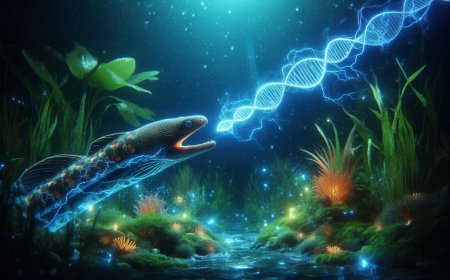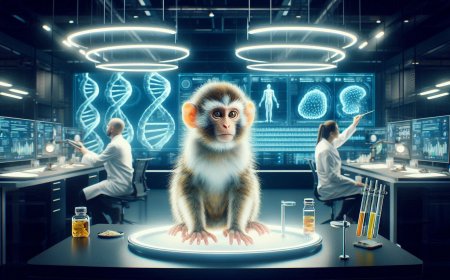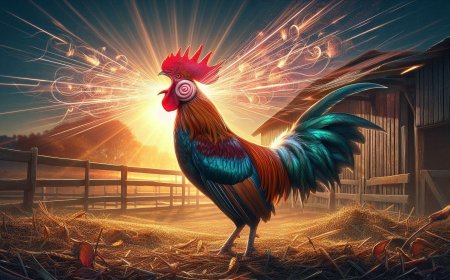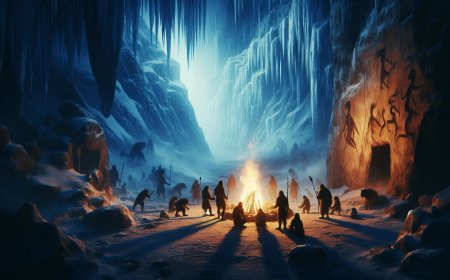From Wolves to Whales: A Tale of Evolutionary Wonder
Discover the astonishing evolutionary journey of whales, from their ancient wolf-like ancestors that roamed the land to becoming the majestic marine giants of today. Explore their remarkable transformation over millions of years, adapting from terrestrial mammals to masters of the ocean.

In the realm of evolutionary biology, few stories rival the astonishing journey of whales—creatures that once roamed the land, reminiscent of wolves, before conquering the vastness of the ocean. This captivating narrative unfolds over millions of years, where ancient terrestrial mammals transitioned into the magnificent marine giants we admire today.
The Ancient Ancestors: A Time of Change
Picture the Earth 50 million years ago: lush landscapes dotted with diverse wildlife, including early mammals that hunted, explored, and thrived on land. Among them were ancient creatures resembling wolves, who roamed near the shores, drawn by the promise of abundant food in the shallows. These mammals, known as Pakicetus, are the ancestors of modern whales, marking the beginning of a remarkable evolutionary saga.
The transition from land to sea wasn’t abrupt; it was a gradual journey fueled by the need to adapt to a changing environment. As these ancient beings ventured closer to water, they discovered a new world filled with opportunities and challenges. Their survival instincts drove them to dive beneath the surface, hunting for fish and aquatic prey.
The Metamorphosis: From Four Legs to Flippers
As the centuries passed, the Pakicetus transformed in ways that seemed almost magical. Natural selection favored those who excelled in aquatic environments. Slowly but surely, their bodies began to morph. Limbs turned into flippers, enhancing their ability to glide through water, while tails evolved into powerful propellers, allowing for swift movement across the waves.
This evolutionary metamorphosis didn’t stop at physical changes; it extended deep into their biology. They developed mechanisms to drink seawater, filtering out the salt, and adapted their reproductive behaviors to give birth in the water, ensuring the survival of their young in their new oceanic habitat.
Navigating the Depths: The Evolution of Echolocation
Among the remarkable adaptations was the emergence of echolocation, a sophisticated biological sonar that enabled these ancient creatures to navigate and hunt in the dark, deep waters of the ocean. With this newfound ability, they could communicate, locate prey, and evade predators in ways that would forever change their existence.
Over time, whales evolved into two distinct groups: baleen whales and toothed whales. Baleen whales, like the majestic blue whale, developed unique feeding mechanisms, using baleen plates to filter vast quantities of small fish and krill from the water. Toothed whales, including playful dolphins and formidable orcas, pursued larger prey, adapting their hunting strategies to excel in their watery realm.
Echoes of the Past: Vestiges of Their Ancestry
Despite their impressive adaptations, whales carry echoes of their terrestrial ancestry. Vestigial structures, like hip bones, serve as silent reminders of their four-legged forebears. Even their method of breathing speaks of their origins; they must rise to the surface for air, a lingering connection to the land from which they came.
The story of how whales evolved from wolf-like ancestors to the magnificent creatures we see today is not merely a tale of transformation. It embodies the resilience and ingenuity of life on Earth. It illustrates the profound capacity of nature to adapt, survive, and thrive in ever-changing environments.
A Legacy of Evolutionary Innovation
Today, as we gaze upon the grandeur of whales gliding through ocean depths, we are reminded of their extraordinary lineage—a testament to millions of years of evolution. Their journey is a celebration of life’s adaptability, a narrative that intertwines the past with the present and highlights the interconnectedness of all beings.
In a world where the mysteries of evolution continue to unfold, the story of whales invites us to marvel at nature’s wonders and embrace the intricate pathways that link all life on our planet. From ancient wolves to modern-day leviathans, the journey of whales is a profound reminder that the legacy of our past shapes the future of life in ways we are only beginning to understand.
What's Your Reaction?






































































































